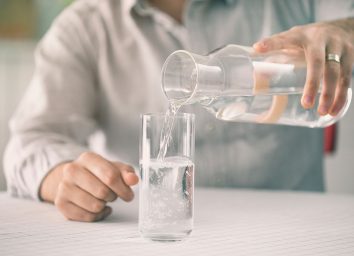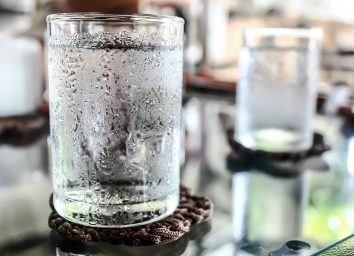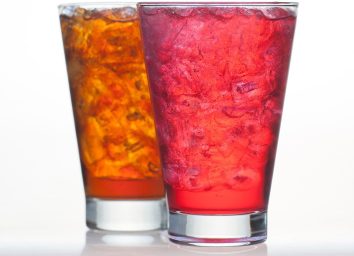Surprising Side Effects of Drinking Too Much Water, Says Science
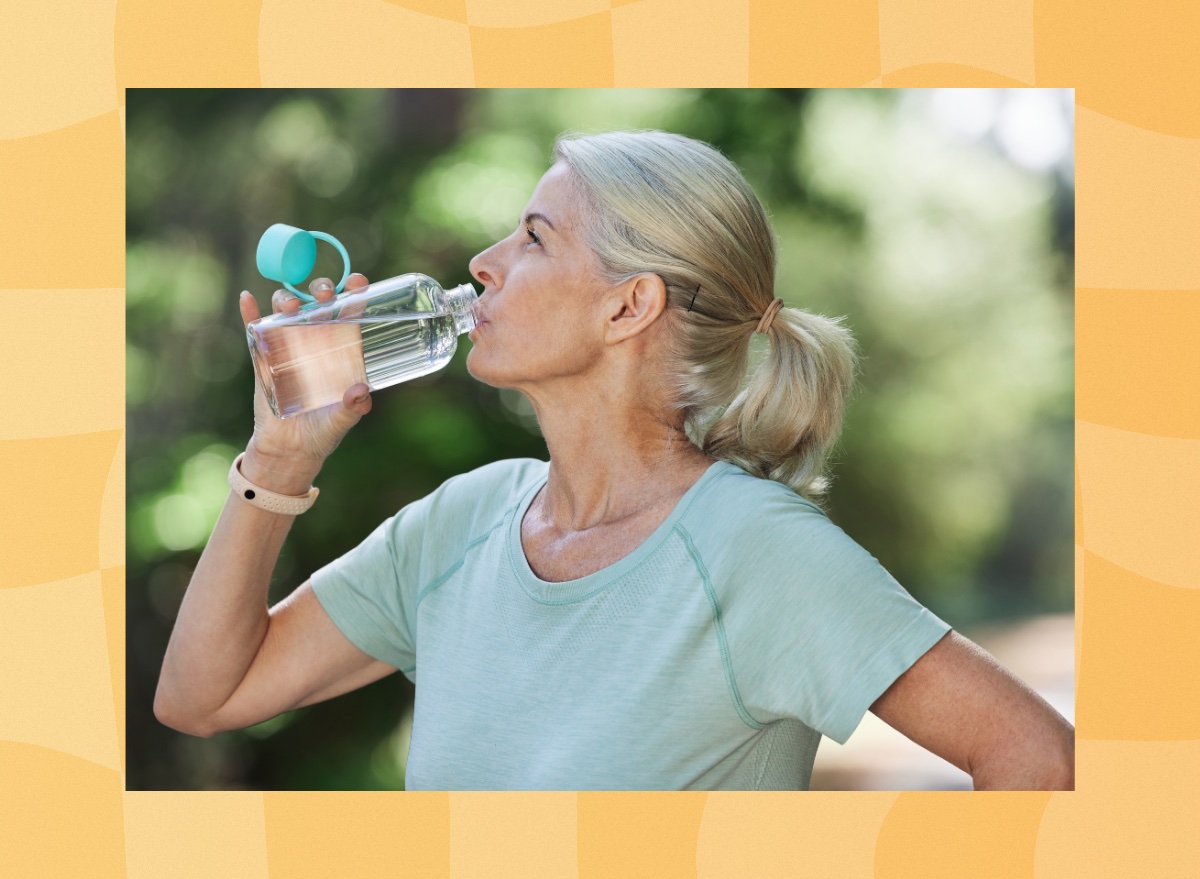
Turns out, you can have too much of a good thing—even when it comes to a life-sustaining substance such as water, which makes up at least 60% of the adult body. (Newborns are more like 78% water—no wonder they’re so squishy!)
But the potential adverse consequences of overhydration are much less understood than the dangers associated with dehydration, says Tamara Hew-Butler, an associate professor of Exercise and Sport Studies at Wayne State University whose research is focused on fluid dysregulation.
With summer afoot, hydration will be a hot topic among wellness evangelists. They routinely tell us what to put in our water to make it even healthier, as well as try to get us to drink more of it. Their encouragement comes from a caring place; water is vital for every cell and powers just about all biological functions, such as regulating our internal temperature, flushing waste out through urination, supporting digestion and metabolism, lubricating our joints, and more.
All that said, you don’t need to chug gallons of the stuff. And doing so could potentially be dangerous to your health, which is why you might want to skip the “hydration challenges” that have popped up on social media and on school campuses.
Learning Your Limits
Conventional wisdom says to drink eight glasses of water a day—but really, doesn’t that depend on how big the glass is? Are we talking juice glass or Big Gulp? The U.S. National Academies of Sciences, Engineering, and Medicine determined that an adequate daily fluid intake is about 15.5 cups (3.7 liters) of fluids a day for men and about 11.5 cups (2.7 liters) of fluids a day for women.
But any recommended amount needs to be adjusted for various factors, including how active you are, what kind of environment you live in (hotter climates cause more water loss), your body weight, or if you’re pregnant.
RELATED: Drinking This During Pregnancy Could Affect Your Baby’s Growth, Science Says
How You Can Overdose on H20
Though rare, water intoxication is a real condition. Despite the name, water will not get you drunk—but it can do much worse things.
The medical name for water intoxication (sometimes called water poisoning) is hyponatremia, which the Mayo Clinic explains “occurs when the concentration of sodium in your blood is abnormally low . . . When this happens, your body’s water levels rise, and your cells begin to swell. This swelling can cause many health problems, from mild to life-threatening.”
The National Center for Biotechnology Information (NCBI) estimates that “3.2 million to 6.1 million people in the U.S. suffer from hyponatremia” a year, though as many as 75% percent of those cases are chronic and asymptomatic. (Meaning, presumably, that you could be taxing your system with overhydration and not even know it.)
There are no official guidelines for how much water to drink, but experts say the maximum amount of water that a person with normal renal function can drink is 800 to 1,000 mL/hr (about 4 cups) to avoid hyponatremia symptoms.
Signs You’re Overhydrated
Here’s where things get really confusing. Many of the symptoms of overhydration are the same as dehydration, including:
- Headache
- Nausea and vomiting
- Confusion
- Fatigue
- Muscle spasms and cramps
One difference? When you’re dehydrated, your urine is a dark yellow color; when you’re adequately hydrated, it’s more like the color of lemonade (sorry!); and if you’re overly hydrated, it may be nearly clear. If you need a color reference, this pee chart might help.
Surprising Side Effects of Drinking Too Much Water
Here are a few of the more dire effects of imbibing more water than your body needs. Later, read up on our list of the 108 Most Popular Sodas Ranked by How Toxic They Are.
Electrolyte imbalances
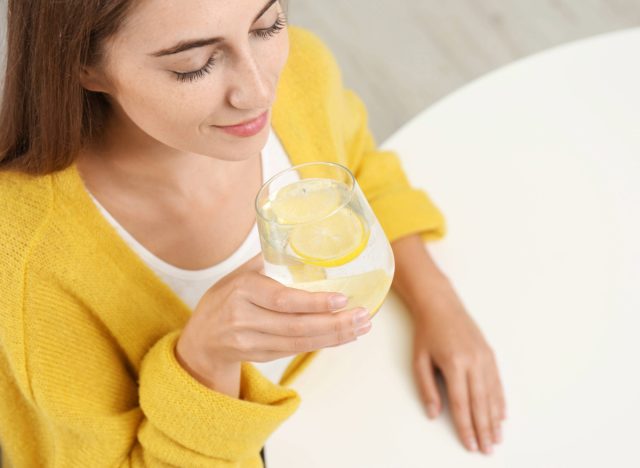
Electrolytes (like potassium, sodium, and magnesium) help regulate the function of your kidneys and your heart. Drinking too much water dysregulates those vital functions.
Water retention/swelling
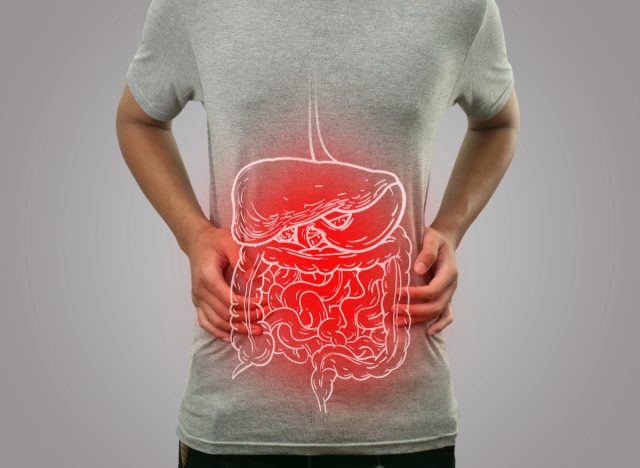
Drinking too much water could lead to low levels of sodium in the blood, which can cause the body’s cells to swell and retain fluid.
Bladder issues

Excessive fluid intake can increase the frequency and severity of Overactive Bladder (OAB) symptoms. Even if you don’t suffer from OAB, your bladder could take a hit.
“Superfluous drinking requires greater muscular effort than drinking when thirsty,” Hew-Butler notes. “Our brain tries to discourage chronic overdrinking (polydipsia) . . . causes chronic peeing (polyuria), which can lead to internal plumbing modifications such as bladder distention.”
Kidney Dysfunction
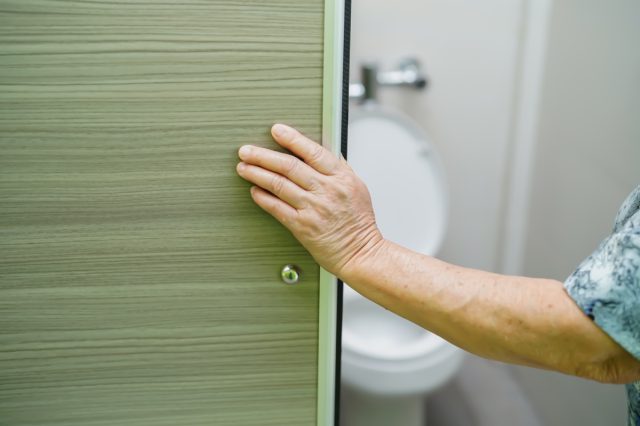
Healthy kidneys are nimble organs that are typically able to adjust the amount of water they command your body to retain or excrete—but they can get overwhelmed. When you drink too much water, your kidneys can’t get rid of the excess water, according to the Mayo Clinic. Again, the sodium content of your blood becomes diluted as a result, and a chain reaction of biological dysfunction ensues.
Death

In severe cases, cerebral edema (swelling of the brain), heart failure, and other organ shutdowns can be fatal. Deaths are very rare, but they have happened from water-drinking contests, over-rehydration after participating in sports, and in military training situations.
How to Avoid These Surprising Side Effects
And now, here are three solutions for drinking the right amount of water:
Let thirst be your guide
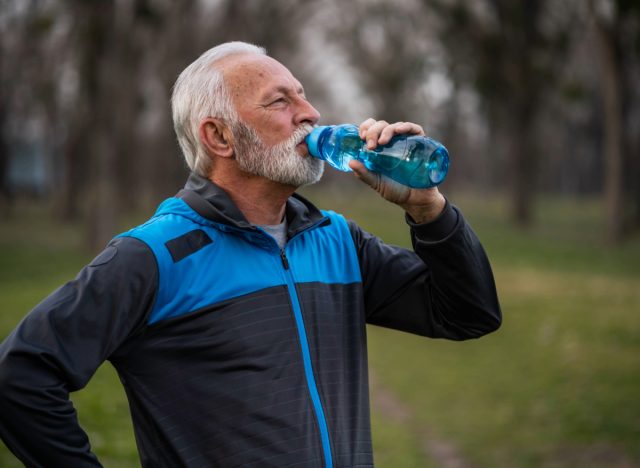
Your body is smart—like Mensa smart—so it knows when it needs something and sends you a signal. You just need to listen, as one study from the National Academies of Sciences, Engineering and Medicine suggests.
Watch your speed
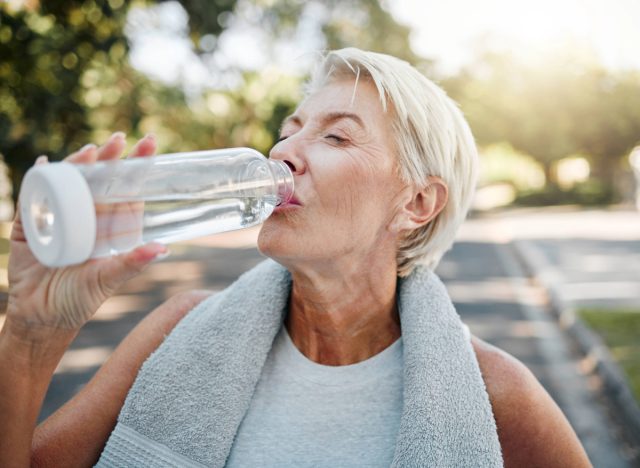
Drinking too much water too quickly is how you get in trouble. (According to this study, one dangerous condition called acute water toxicity is due to the rapid consumption of large quantities of fluids that greatly exceeded the kidney’s maximal excretion rate.) A healthier hydration approach: Drink small amounts more frequently throughout the day.
Eat water-rich foods

Foods that have a high water content count toward your total liquid consumption in a great way because it would be very hard to over-hydrate by eating water-rich foods. “Hydrating foods are best eaten raw,” says Keri Glassman, RD, founder of Nutritious Life. “Cucumbers, celery, grapefruit, cantaloupe, and watermelon are some of my favorites. Iceberg lettuce is another one—it may be lacking in the nutrient department compared to darker leafy greens, but it’s 96 percent water.”
And remember, unhealthy beverages (sodas, juices, energy drinks, etc.) also count toward your total body moisture level. Instead, check out these tasty, healthy ways to stay hydrated.
